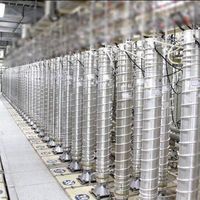Teachers Call For Nationwide Protests After Khamenei Fails To Address School Attacks
Iranian teachers have called for further protests just hours after the Supreme Leader failed to address nationwide school poisonings.
Khamenei had been speaking at an event for the Islamic Republic’s National Teachers’ Day with a cherry picked group of teachers. During the meeting, Khamenei discussed the country’s education system but fell short of even mentioning the months of gas attacks against the schools across Iran which have left thousands of schoolgirls sick and hospitalized.
Instead of addressing one of the biggest human rights violations of recent months, affecting over 130 schools, Khamenei talked about pushing the regime’s extremist brand of Islam in the country’s education system.
He voiced the necessity of keeping schools under state control, encouraging students to attend religious ceremonies at mosques and praised the old generation of Iranian teachers who made students go to war with Iraq from 1980 to 1988. According to Khamenei's statistics, this led to “the martyrdom of 36,000 students”.
The Coordination Council of Iranian Teachers' Trade Associations reacted quickly and issued an outraged statement on Tuesday, calling on teachers and educators to protest outside Education Ministry branches across the country and outside the parliament in Tehran on Tuesday..
The rallies were scheduled for May 9 as a tribute to Jabbar Baghcheban, also known as Mirza Jabbar Asgarzadeh, an Iranian inventor and educator born on May 9, 1886, who established the first Iranian kindergarten and the first deaf school.
The council stressed the necessity of ending the "dominance of the ruling totalitarian ideology" in Iranian schools, claiming the current incompetent managers of the educational system should be replaced by those educated under more modern, secular pedagogy.
In addition to their usual demands such as better salaries and working conditions, the teachers’ council reiterated that Iran’s education system will not improve without a fundamental change.
"Without a deep and critical review of the intellectual and political foundations of the ruling ideology; without critical restructuring in school governance and management practices; without accepting the individual, cultural and social differences of students; … and without fundamental changes in the existing and failed mechanisms of school administration, the education system in the country will not bear fruits,” read their statement.
They also voiced support for the recent wave of protests by teachers and families of students who have been victims of mysterious chemical attacks on schools, which have been going on for at least six months.
While Khamenei was delivering his speech, more videos surfaced on social media of at least six schools that were attacked by an unknown chemical that has affected scores of mostly girls’ schools, since November.
In the videos, parents are seen anxiously comforting their children suffering from symptoms such as nausea and dizziness, while other videos showed ambulances taking students to hospital. Similar attacks were also reported both a day before Khamenei’s speech and a day after it on Monday and Wednesday.
The attacks have been condemned on the global stage by the likes of the UN and US, with calls for the regime to find the culprits, though it is unlikely attacks of such a scale could be perpetrated without the tacit approval of Tehran.
One of the schools in the Kurdish-majority of Sanandaj was raided by security forces after the latest attack, not to arrest the assailants but to beat the students and parents who showed anger at the regime’s handling of the issue.
In one video showing people running with panic through the corridors of a hospital, a woman is heard saying the girl filmed was hit on the head with a baton. Over 500 civilians have died at the hands of such brutality since protests against the regime began in September, with thousands more imprisoned.







